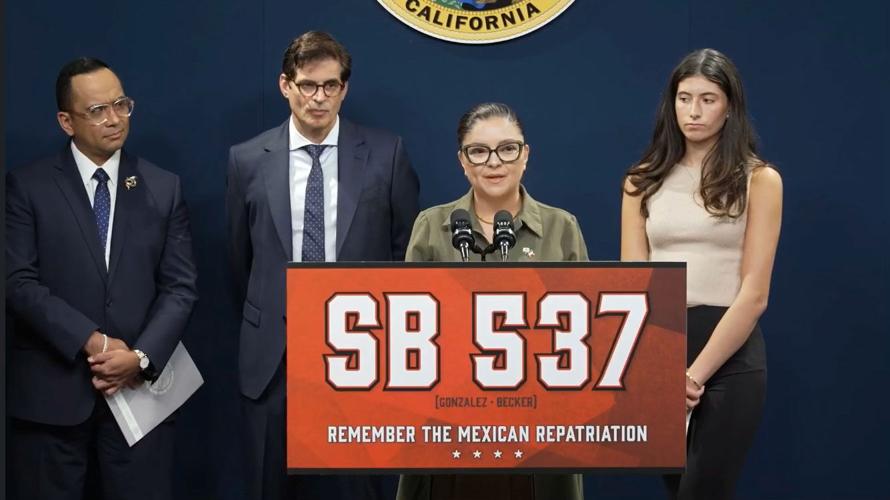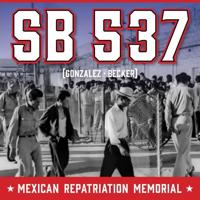
Consul General of Mexico in Sacramento Christian Tonatiuh González, State Senator Josh Becker (D-Menlo Park), Senate Majority Leader Lena Gonzalez and Tamara Gisiger, Student. Credit: Office of Senator Lena Gonzalez
A little over two years ago, student Tamara Gisiger didn't know about the Mexican Repatriation Program of the 1930s even though she migrated to the United States as a child. In her native Mexico she had never heard the term Hispanic either and she only identified as Mexican.
Curious about her past, she wrote a paper for her history final in high school on the Great Depression and how Mexicans were affected.
To her surprise, she learned that in 1929, after the Wall Street crash and rising economic crisis, President Herbert Hoover issued an executive order for the forcible removal of more than one million Mexicans and Mexican Americans to save jobs for "real Americans."
For the next six years or so, the mass deportation included about 60% of U.S. citizens of Mexican descent. That was considered the biggest exodus in American history.
Intrigued by learning more about her past to predict her future, Gisiger continued questioning and researching about the Mexican Repatriation Program, a policy that many consider was based on racism. She learned the stories were even closer to her than she could imagine.
"My cousin's grandfather was part of this, and she didn't even tell me until I spoke out about this, when I first came out with my paper," Gisiger recalled Wednesday.
As a student activist, Gisiger took the issue all the way to California legislative representatives who decided to take action.
During a press conference last Wednesday, Gisiger, accompanied by California Senate Majority Leader Lena Gonzalez (D-Long Beach), Senator Josh Becker (D-Menlo Park), and Consul General of Mexico of Sacramento Christian Tonatiuh González, called for the passing of SB 537, the Memorial to Forcibly Deported Mexican Americans and Mexicans.
Through this bill, advocates want the California government to create a commemoration in the form of a statue or other appropriate memorialization to shed light on the injustices suffered and ensure such a historical travesty is never forgotten.
This year marks the 95th anniversary of the Mexican Repatriation Program and many people don't know about this historic moment.
Why it matters now

Credit: Office of Senator Lena Gonzalez
Senator Becker said the Mexican Repatriation Program violated the civil and constitutional rights of hundreds of thousands of people, and they cannot permit another anniversary to pass without being properly recognized. He also recognized that as a history major, he didn't know about it and there's a lot of people like him.
"People don't know that the repatriation ripped families apart," said Becker. "They do not know about the generational trauma that was caused by it, and we need to memorialize it in a much bigger way."
Becker said the topic matters more than ever now as we approach the upcoming presidential elections and we are seeing the same kind of hateful, violent rhetoric coming from political leaders: the calls for mass deportation.
"For those saying ‘this is rhetoric, it will never happen,’ we are here to say this happened in the past and obviously could happen again," said the assemblyman.
The rhetoric can often be heard during the Trump/Vance Republican presidential campaign. Both candidates–Donald Trump for president and JD Vance for vice president–have promised, if they win the presidential election, mass deportations of undocumented immigrants, finishing the border wall and militarizing the border if they win the presidential elections.
While they focus on highlighting how immigrants will be punished, Gonzalez said it is vital to mention the Latino contribution to the state and the country. There are about 16 million Latinos in California, making up almost 40% of the state's population, according to the Pew Research Center.
Latinos in California hold some of the highest labor force participation rates, contributing over $80 billion in taxes and bringing nearly $1 billion to the state's economy. During the pandemic, Latinos helped the country's economy stay afloat, with a total economic output of $3.2 trillion.
"But we are not just dollars and cents. We are human beings, and we put so much value and integrity into the work we do every day to make California and this great nation the best it is," Gonzalez said.
Gonzalez recognized the effort of younger generations like Gisiger for paying attention to history. She said this bill can prevent another repatriation from happening.
While the estimate of Mexican repatriations during the 1930s Great Depression fluctuated between 400,000 and one million, the U.S. Citizenship and Immigration Services indicates no federal record appears as only a few were expelled under formal Immigration and Naturalization Service (INS) removal proceedings.
Through SB 537, Gonzalez hopes there will be a team effort to ensure that every single child in California can learn about this dark history, commemorate it and create a better future generation that understands the history and acknowledges it.
A call to action
In an effort to prevent this chapter from being overlooked again, SB 537 will require a the construction of special memorial in Los Angeles, the epicenter of the repatriation, where trains left Union Station with thousands of Mexicans. Currently, 74% of Los Angeles' Latino population is of Mexican descent.
It also includes a call to action with three pillars: immediate historical acknowledgement to provide formal and unequivocal recognition of the Mexican Repatriation Program; educational transformation to raise awareness of this critical history to ensure future generations understand the full scope of its impact; and community healing and justice to honor the legacy of those affected and support the healing process.
Becker said that while the statue doesn't change what happened in 1930, it serves as a dignified and appropriate beginning in commemorating those impacted by this horrific policy.
Twenty years ago, another bill, SB 670, the "Apology Act for the 1930s Mexican
Repatriation Program," was implemented. California's official apology, however, is not recognized in the present.
Gisiger said the issue is ongoing and shouldn't be forgotten. She emphasized how, in the past, local governments used military tactics like fear, roundups and raids.
"It's vital for my generation to know that this happened again in the 60s," said Gisiger. She referred to Operation Wetback, an immigration law enforcement initiative by INS.
In the early 50s, about five million Mexicans were brought to the United States under temporary work visas under the Bracero Program during World War II. However, after concerns about illegal immigration by companies and farmers, the U.S. Border Patrol deported about 1.1 million Mexicans.
"We cannot accept being seen as buffers. We are a vital part of the American economy," said Gisiger.
SB 537 is supported by groups such as the Dolores Huerta Foundation, the United Farmer Workers, the Cesar Chavez Foundation and the California Immigrant Policy Center.
The Assembly Committee on Governmental Organization voted unanimously in favor of SB 537. The bill now advances to the full Assembly for further consideration.
This resource is supported in whole or in part by funding provided by the State of California, administered by the California State Library in partnership with the California Department of Social Services and the California Commission on Asian and Pacific Islander American Affairs as part of the Stop the Hate program. To report a hate incident or hate crime and get support, go to CA vs Hate.













(0) comments
Welcome to the discussion.
Log In
Keep it Clean. Please avoid obscene, vulgar, lewd, racist or sexually-oriented language.
PLEASE TURN OFF YOUR CAPS LOCK.
Don't Threaten. Threats of harming another person will not be tolerated.
Be Truthful. Don't knowingly lie about anyone or anything.
Be Nice. No racism, sexism or any sort of -ism that is degrading to another person.
Be Proactive. Use the 'Report' link on each comment to let us know of abusive posts.
Share with Us. We'd love to hear eyewitness accounts, the history behind an article.